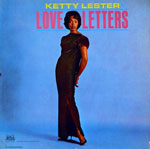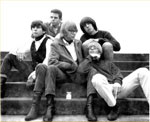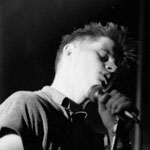
Like the Numero Group lit up 2005 with a series of beautifully packaged salvage operations, with lots of old soul and funk, and a great power pop set called Yellow Pills. The power pop set was put together by an obsessive fan, Jordan Oakes, and the accompanying booklet included a snapshot of his place, with the obligatory jumble of CDs, posters, dusty old vinyl, vibes and scribes, and there at the front a DVD of the original Gidget teen-surf movie, which starred James Darren, who also appeared in Venus In Furs, as a Chet Baker-like troubled trumpeter, with soul star Barbara McNair. And there in Gidget crooning away as one of the Four Preps is Ed Cobb, who would later emerge after success with Ketty Lesterís 'Love Letters' as one of those seemingly straight West Coast Ď60s risk takers, who was part-producer, A&R man, songwriter, svengali, and visionary in the right place at the right time.
When Motown reached out to the West Coast and were set to launch what should have been its brightest star, Brenda Holloway, it got Ed Cobb in to write 'Every Little Bit Hurts'. And songs donít come any better. The introduction alone can break your heart, though credit should go to producer Hal Davis for putting Brenda under pressure in the studio so that every little bit did hurt. Cobb also created the classic torch follow-up, 'Iíll Always Love You', but Motown miserably failed to make the most of its greatest asset. By all accounts Brenda really did look too good and talk too wise.
Among the other songs Cobb created were 'Tainted Love' for Gloria Jones, and 'Touch of Venus' for Sandy Wynns, which was also recorded by Patrice Holloway, and criminally locked away in the Motown vaults for forty years. Another Cobb creation for Gloria Jones was 'Heartbeat', a completely over-the-top gospel punk storm, which I first heard on the Capitol Soul Casino compilation, where it fitted alongside Patrice Hollowayís 'Love And Desire', and the garage punk/blue-eyed soul of the Outsiders and Human Beinz, not to mention 'So Is The Sun' by the World Column which The Jam in turn appropriated. Kent would do collect similar sounds on its Right Back Where We Started set from 1985. Authenticity might not be the word to the fore, but we havenít stopped dancing yet.

Ed Cobbís fingerprints are all over the garage punk sound. As a svengali figure he took on two of the best responses to the UK ríníb insurgency in the Standells and Chocolate Watchband, and worked his magic. The songs, complete punk classics, he created for them include 'Dirty Water', 'Rari', 'Sometimes Good Guys Donít Wear White', 'Why Pick On Me', 'Sweet Young Thing', 'She Weaves A Tender Trap', and 'No Way Out'. What more do you need to know?
Sure, Cobb ran into trouble and let his vision get in the way of democracy, and that vision involved using black session musicians, and blurring the lines between the soul scene and the punk thing. But who cares when it gets you out on the floor, where the guitars are ringing? I can understand real music purists carping at the idea of interference, but when you listen to the Standells and Chocolate Watchband why worry?
Perhaps the best of the songs Cobb created for the Standells was 'Barracuda', which would later be covered by an early incarnation of The Jesus and Mary Chain, when they wore Mondrian style shirts like Buzzcocks, and the guitars were cranked up so high, with the fuzz and distortion on overdrive, that the guitars pretty much played themselves, as the Reid brothers sulked under Birthday Party plumes, and Douglas Hart amused himself playing Buzzcocks motifs on his black and white Pollock-ed two-string bass.
In the mid-80s The Jesus and Mary Chain were one of half a dozen garage punk kickstarted groups in the international pop underground. These were the exceptions that rose above the sub-Velvets/Beefheart/TV Personalities inspired anaemic morass. Even better and wilder than the Mary Chain were the Jasmine Minks, who covered Ď60s punk classics like We The Peopleís 'In The Past' and Loveís 'Seven and Seven Is'. Elsewhere the Wolfhounds beat The Fall in covering 'Mr Pharmacist', and like the Chocolate Watchband they dug up the Kinksí 'Iím Not Like Everybody Else'.

Looking at now, when quite clearly the ideas occasionally shaping black urban sounds are so far ahead, it seems astonishing more producers do not follow the direction Ed Cobb struck out in. If you take say Timbaland and Missy Elliott, the Neptunes and Kelis, Rich Harrisonís work on Beyonceís 'Crazy In Love' and Amerieís '1 Thing', then it seems strange how these ideas have not permeated through and shaken up the more traditional pop underground more.
And the sadly ironic thing about the independence of groups like the Jasmine Minks, Wolfhounds, Laugh! and Stockholm Monsters is that they never really had a svengali figure like Ed Cobb to shape their sound, and shake things up.
© 2006 John Carney